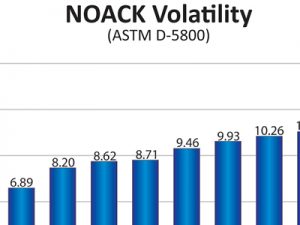Low-Volatility motor oil helps unlock vehicle performance
To meet today’s strict motor oil specifications and adequately protect modern engines, motor oils must demonstrate increased resistance to volatility. Nearly 30 years ago AMSOIL became the first oil manufacturer in the United States to use the NOACK Volatility Test (ASTM D5800) as a measure of performance excellence. Today, it’s an industry standard.
Why is Volatility Important in your Lubricant?
Modern engines, particularly those equipped with performance-enhancing technologies like direct fuel injection and turbochargers, generate increased heat compared to their predecessors. At elevated temperatures, such as during severe service or when driving in hot summer weather, the oil’s lighter-weight molecules can volatilize, or literally “boil off.” The more volatile a lubricant is, the lower the temperature at which the lubricant will begin to evaporate. The more it evaporates, the less oil is left to protect equipment and the faster a user must replace the lost oil. You may have experienced this phenomenon by owning an automobile that “uses” motor oil in irregular intervals.
Volatility affects more than the rate of oil consumption. When light elements in oil evaporate from heat, the oil’s viscosity increases. This thicker oil forces the engine to work harder, resulting in several problems, including the following:
- Reduced performance
- Reduced fuel economy
- Poor cold-temperature starting
- Increased engine deposits
- Out-of-balance oil formulation, potentially leading to a higher concentration of additives than designed
Sludging engines are common still today
The issue of deposits can be a severe one. Many engines today suffer from sludging issues (Chevy 5.3L engine for example) which are known as design issues. But AMSOIL customers have found out our product actually solves the majority of the problem. It does such a good job, many mechanics can’t believe it as this level of quality isn’t discussed in typical training.
NOACK Volatility Test (ASTM D5800)
“I’m not buying an expensive oil because I just change it every 3-5K miles anyway” – Well you can change the oil every day but a run of the mill oil will not protect modern engines from issues that rely on quality lubricants to prevent deposits from oil volatility. This issue can happen seconds after changing oil.
The most common method used in measuring oil volatility is the NOACK Volatility Test. But that hasn’t always been the case. Originally developed and used in Europe, the NOACK test was not commonly used for lubricants until AMSOIL President and CEO Al Amatuzio pioneered its use for automotive motor oils in 1985. Previously, a lubricant’s flash point was the primary way to approximate an oil’s volatility.
In the NOACK test, an oil sample is weighed and heated to 250°C (482°F) for one hour. Dry air is passed over the sample, carrying the oil vapors that have boiled off and depositing them in a beaker. The original sample is removed and re-weighed. Any reduction in weight is reported as a percentage lost of the original weight
Superiority of AMSOIL Synthetic Motor Oils
When AMSOIL began using the test, it was common for competitors’ conventional oils to demonstrate a volatility loss in the 17-25 percent range. In contrast, the volatility loss of AMSOIL synthetic motor oil was often less than half that. The NOACK Volatility Test introduced a new measure of performance to the industry, while allowing AMSOIL to distinguish the performance of its synthetic motor oils from competitors.
Currently, API SN and ILSAC GF-5 performance classifications require weight lost due to volatility to be no greater than 15 percent for all viscosity grades of motor oil. General Motors’ proprietary dexos1™ motor oil specification is more stringent, requiring no greater than 12 percent weight lost.
AMSOIL synthetic motor oils are more stable and heat-resistant than conventional oils. They resist volatility to resist deposits and oil thickening, maximizing fuel economy and engine performance and life.
| Performance Specification | API SN | ILSAC GF-5 | GM dexos1™ |
| NOACK Volatility Limit, % weight loss(g/100g) (ASTM D5800) | 15% | 15% | 12% |
Did You Know?
If a vehicle “uses” oil it may be due to the oil’s volatility. The light-weight molecules in oil evaporate more readily when exposed to high temperatures, causing the oil level to drop. Switching to AMSOIL synthetic motor oils, which resist volatility better than conventional oils, can reduce oil consumption and maximize engine performance.






